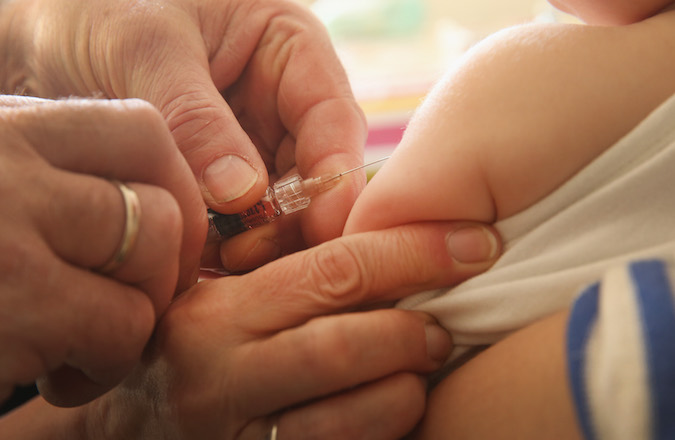
The Israeli government is considering penalizing parents who refuse to vaccinate their children. (Sean Gallup/Getty Images)
TEL AVIV (JTA) — Each month, the Israeli government sends a check to every Israeli family with at least one child. The more children you have, the more money you get.
Unless, that is, you don’t vaccinate your children.
According to a clause in the coalition agreement signed last month by the ruling Likud party and the haredi Orthodox United Torah Judaism party, Israel will not provide child allowances to families that refuse to vaccinate their children. Should the Likud-led coalition enact the clause as part of next year’s government budget, it would be a harsh penalty for so-called “anti-vaxxers.”
A 2014 State Comptroller’s report said that as of 2010 up to 10 percent of Israel’s children have “anti-vaxxer” parents. Those parents, according to a 2011 University of Haifa study, come largely from haredi and low-income populations, as well as from Israel’s upper class. In addition, according to Arab-Israeli legal rights group Adalah, vaccination rates are low among Bedouin Israelis due to lack of access to health services.
“There’s a phenomenon that people don’t vaccinate their kids,” said Yaakov Isaac, spokesman for Deputy Health Minister Yaakov Litzman, who will set criteria for which parents will qualify for subsidies. “There are people — Bedouins, extremist haredim — who don’t trust the health system.”
Fears that vaccines are linked to autism — such connections have been debunked by the scientific research — are cited less frequently in Israel than they are in the United States.
Those who support the clause say it’s a necessary public health measure, aimed at forcing the hand of those who refuse to vaccinate their children. A Likud spokesman did not return calls seeking comment on the party’s support of linking vaccinations to child subsidies.
The clause is the latest in a string of government attempts to use child subsidies to influence citizens’ behaviors and shape the contours of Israeli society.
Haredi Orthodox parties support high subsidies because they enable large families, typical of those parties’ constituents, to make ends meet. Secularist parties, by contrast, see high subsidies as a counterproductive entitlement that allows parents with many children to avoid working.
“Throughout the years [child subsidies] became a bargaining chip in coalition agreements,” said Noam Gruber, a senior researcher at the Shoresh Institute, a think tank focused on socioeconomic issues. “When you give a high child subsidy, it becomes normative that a woman will stay home and have children. That blocks the path to education and work.”
Introduced in 1959, the subsidies got higher as families grew larger. Until recently, the payments worked on a progressive scale, so that parents received a larger per-child subsidy for each subsequent child. A 2001 law penned by a UTJ lawmaker gave a family with one child approximately $40 per month, while a family with five children received about $600 per month — including a $200 addition for the fifth child.
Facing an economic crisis in 2003, then-Finance Minister Benjamin Netanyahu cut the total subsidy budget by 40 percent. Ten years later, then-Finance Minister Yair Lapid cut the subsidies again as an incentive for haredi men — many of whom studied Torah all day — to join the labor force.
Lapid’s cuts, which are currently in place, replaced the progressive payment scale with a flat scale. Families receive approximately $36 per month per child, no matter how many children they have.
After payments began in 1959, the number of large families ballooned. In 1960, there were fewer than 40,000 Israeli families with four or more children. By 1975, that number had nearly tripled to 111,000.
“These families support themselves with subsidies,” Mickey Levy, Lapid’s deputy finance minister from 2013 to 2014, told JTA. “We addressed this issue to integrate these people in the labor force. When we were in exile in Poland, we didn’t sit and learn Torah all day. We worked and we learned Torah.”
The subsidies are one of several Israeli pro-natal policies, enacted in part to maintain a Jewish majority in Israel and replenish Jewish numbers following the Holocaust, Gruber said. Alongside the subsidies, the government provides three months of paid maternity leave and safeguards against firing pregnant women.
“We feel we need a higher birth rate,” Gruber said. “We don’t want to be in the situation of Western Europe and Japan, of a population that’s getting smaller. In the context of the Jewish nation, we want numbers.”
Now, with Lapid’s Yesh Atid party out of the governing coalition, and haredi parties back in, subsidies are set to rise again. The Likud-UTJ agreement includes a rollback of Lapid’s cuts, which UTJ spokesman Yair Eiserman said is part of a package of reforms to help poor Israelis — including, for example, free dental care for children.
“We wanted there to be a social change,” he said. “The last government hurt the weaker classes and the middle class. There were dramatic blows to national insurance, welfare. We saw to it to change the situation, to guide budgets to the weaker classes so they won’t collapse under the economic burden.”
Critics of the anti-vaxxer clause say it will hurt poor families. According to the 2014 State Comptroller’s report, as of 2010, the number of unvaccinated children had been growing, many from haredi or Bedouin families who refused vaccines either because of misinformation or an ideological opposition to vaccination. While Jewish Israelis, on average, had fewer than three children per family according to a 2009 Central Bureau of Statistics report, Muslim Israelis had an average of 3.62 and haredi Israelis 6.53.
“We cannot agree to a precedent that hurts children due to actions of their parents that the state does not like,” Yizhak Kadman, executive director of the Israel National Council for the Child, wrote in an email to JTA. “Cutting the child subsidies will unnecessarily hurt poor families and weak populations that are sometimes excluded from health services.”
Activists for Arab-Israeli rights also support high subsidies due to the above-average Arab-Israeli birthrate, as well as the community’s high rates of poverty. Eyad Snunu, chief economist for Arab-Israeli advocacy group Mossawa, told JTA the government should invest in Arab communities if it wants to increase labor force participation — not cut subsidies.
“The statistics show that immediate cancellation of the subsidies, without preparing the ground for employment training, only deepens poverty,” Snunu said.
Gruber sees high child subsidies as an unsustainable burden on taxpayers. But those attempting to cut the payments, he said, should learn from previous cuts, which proved debilitating for poor families.
“They cut a lot of money from the subsidies and pushed families into real poverty,” he said. “On the other hand, there wasn’t enough emphasis on giving them the tools to enter the work force.”
JTA has documented Jewish history in real-time for over a century. Keep our journalism strong by joining us in supporting independent, award-winning reporting.






